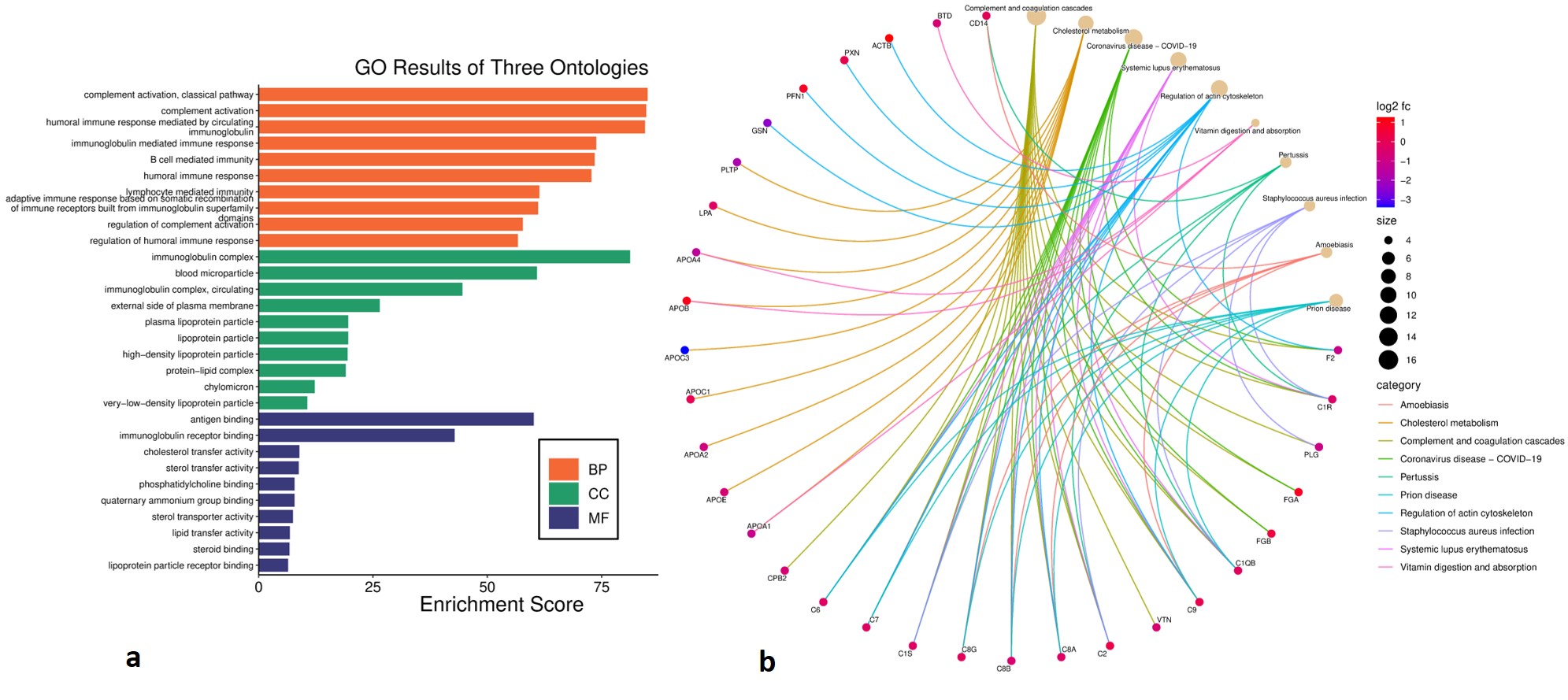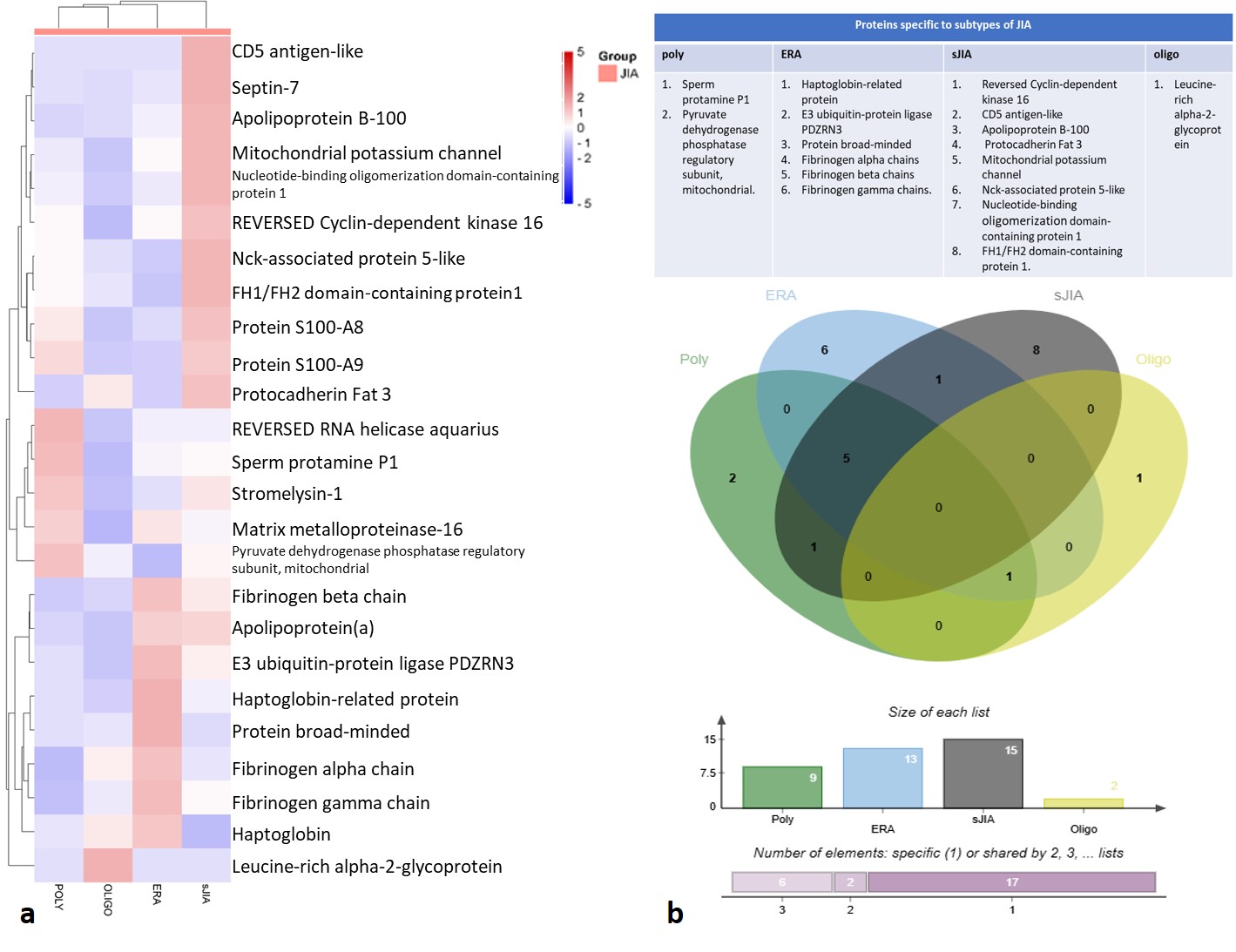Session Information
Session Type: Poster Session A
Session Time: 10:30AM-12:30PM
Background/Purpose: Juvenile Idiopathic Arthritis (JIA) is heterogenous group of inflammatory disorder with clinically distinct subtypes; polyarticular, oligoarticular systemic onset JIA (sJIA), and enthesitis-related arthritis (ERA). The molecular basis of different subtypes of JIA remains poorly understood. Given the close proximity of synovial fluid (SF) to inflamed joints, its proteomic signatures might help in understanding the pathogenetic pathways. Using Isobaric Tag for Relative and Absolute Quantitation (iTRAQ) coupled with Liquid Chromatography-Mass Spectrometry (LC-MS/MS), we conducted a proteomic analysis of SF in children with JIA to delineate subtype-specific proteomic signatures.
Methods: SF samples from 48 children (45 with JIA and 3 controls) were analysed. Proteins were extracted, labelled with iTRAQ for quantification, and analysed by LC-MS/MS. The identified proteins found underwent Gene Ontology (GO) and Kyoto Encyclopaedia of Genes and Genomes (KEGG) enrichment analysis which elucidated associated biological pathways of upregulated proteins. A 5-fold change in protein expression, compared to control was considered significant. Written informed consent from all the participants was obtained and the study was approved by Institute ethics committee.
Results: We identified over 282 SF proteins exhibiting differential expression in various subtypes of JIA. GO analysis showed enriched patterns largely to the immune response and complement activation-related biological processes (Fig 1a). The KEGG analysis showed maximum enrichment in the complement activation, regulation of the actin cytoskeleton cholesterol metabolism, vitamin and fat digestion and absorption, and ferroptosis pathways (Fig 1b). The proteins showing a more than 5fold change showed differential expression profiles among subtypes of JIA (Fig 2a) and were compared to distinguish between the different subtypes of JIA vs control (Fig 2b). Polyarticular JIA displayed 9 SF proteins, including Pyruvate dehydrogenase phosphate as unique. ERA revealed 13 proteins, 6 of which were unique including haptoglobin-related and fibrinogen proteins. sJIA exhibited 15 proteins, 8 unique including FH1/FH2 domain, mitochondrial potassium channel, apolipoprotein, and Nck-associated protein. Oligoarticular JIA showed 2 proteins, including the unique leucine-rich alpha-2-glycoprotein. Proteins S-100, Septin 7, MMP-16 etc, were commonly upregulated in all subtypes of JIA except oligo. Haptoglobin was upregulated in all except sJIA.
Conclusion: Distinct proteomic profiles in JIA subtypes suggests distint pathogenic pathways in various subtypes.
To cite this abstract in AMA style:
bagri n, srivastava s, singh y, Velpandian T, Upadhyay A, kumar v, Karmakar S, Kabra s. Proteomic Signatures of Synovial Fluid in Different Subtypes of Juvenile Idiopathic Arthritis [abstract]. Arthritis Rheumatol. 2024; 76 (suppl 9). https://acrabstracts.org/abstract/proteomic-signatures-of-synovial-fluid-in-different-subtypes-of-juvenile-idiopathic-arthritis/. Accessed .« Back to ACR Convergence 2024
ACR Meeting Abstracts - https://acrabstracts.org/abstract/proteomic-signatures-of-synovial-fluid-in-different-subtypes-of-juvenile-idiopathic-arthritis/


